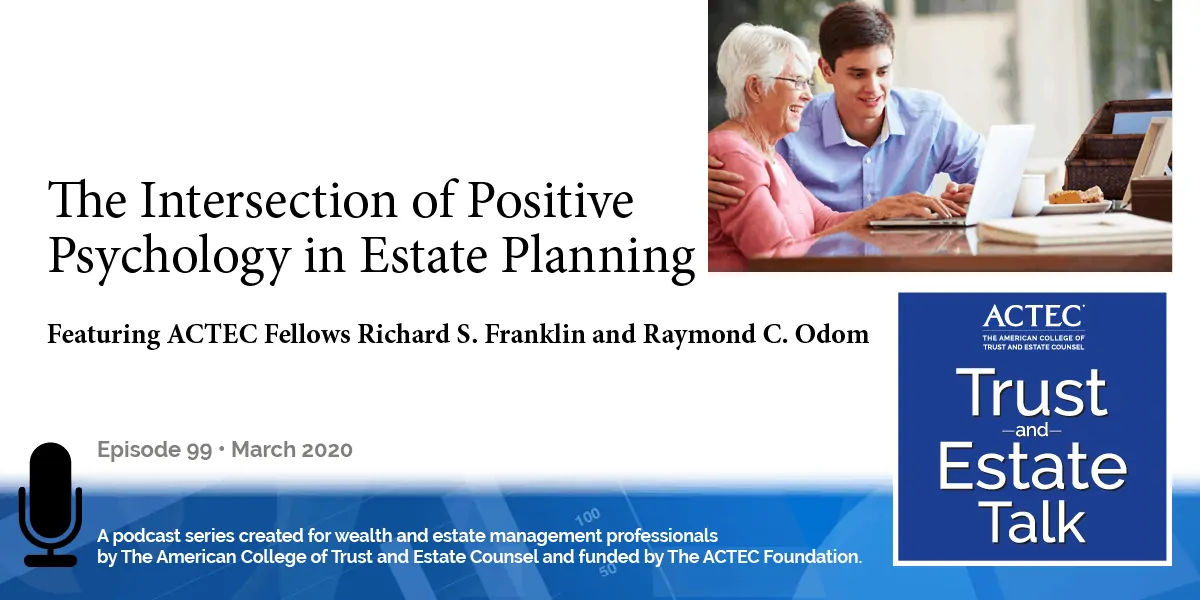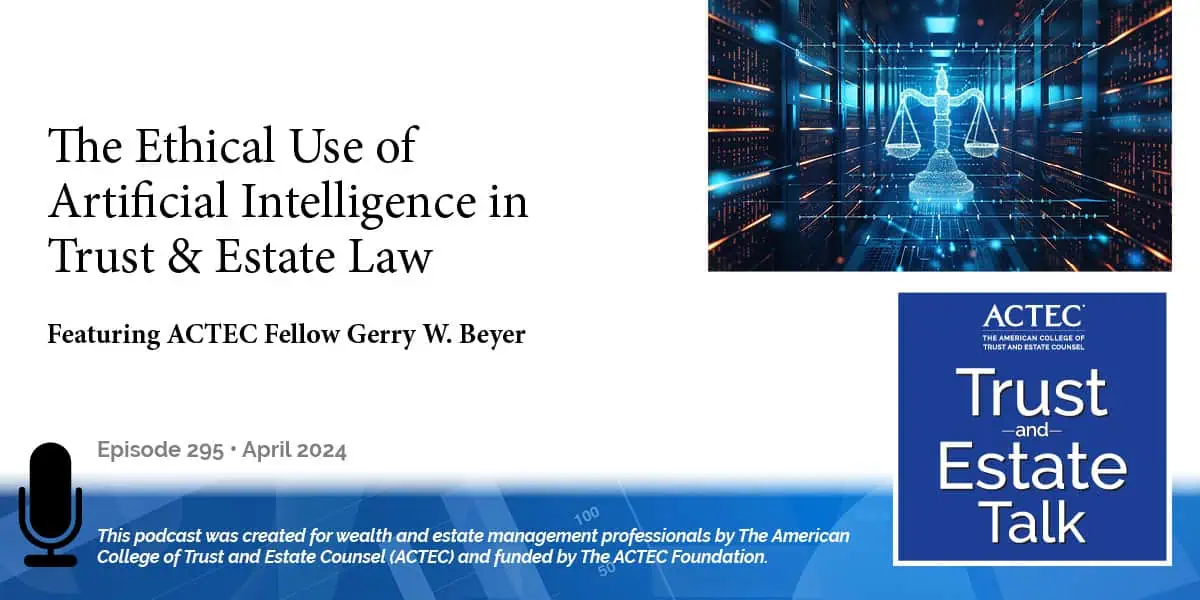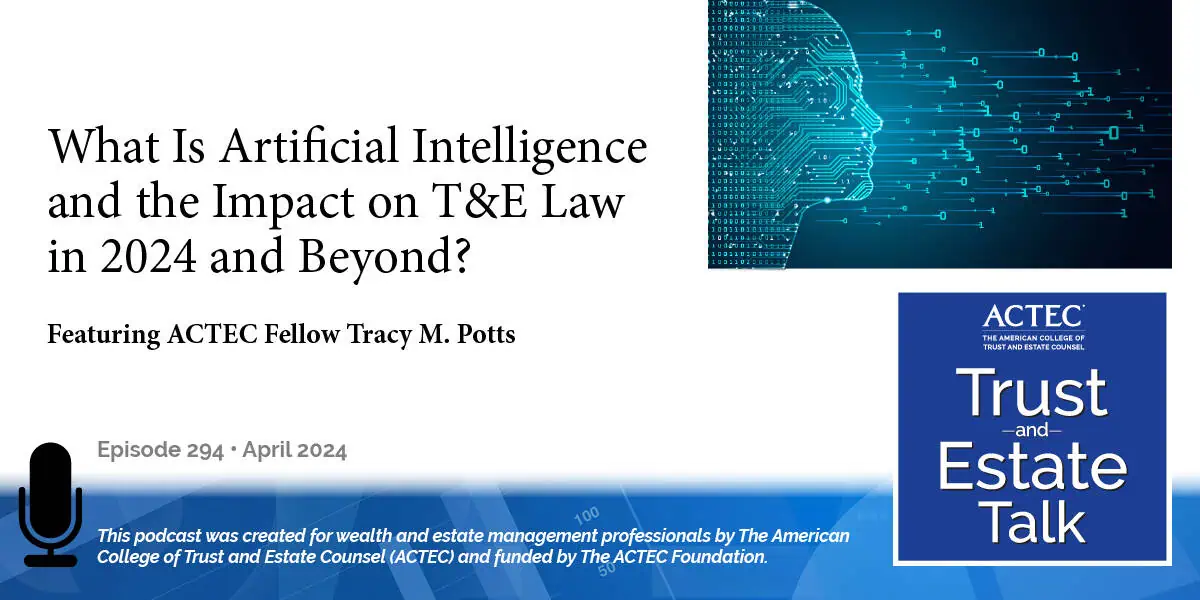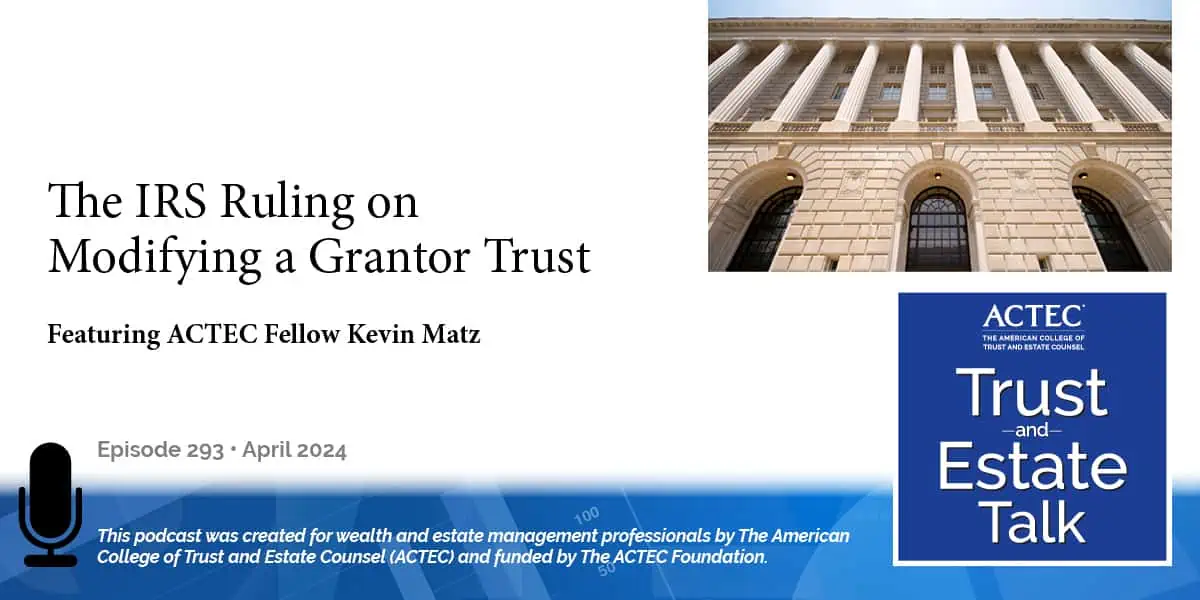The Intersection of Positive Psychology in Estate Planning

“The Intersection of Positive Psychology in Estate Planning,” that’s the subject of today’s ACTEC Trust and Estate Talk.
Transcript/Show Notes
This is Stacy Singer, ACTEC Fellow from Chicago. We will be discussing creative positive experiences to develop well-being. To give us more information on this topic, you will be hearing today from ACTEC Fellow Richard Franklin of Washington, D.C., and Fellow Ray Odom of Chicago, Illinois. Welcome, Richard and Ray.
Thank you. Well, it’s really exciting to be here, and I am so excited to be here with you, Ray. You are such an expert on this subject. Historically, there has been so much focus about the ways that people spend that are negative, you know, and we talk about that all the time in the trust and estates world. But there is not much discussion focused on positive ways to spend. And so, it’s really cool to have you here to talk about the, you know, positive experiences and ways that, even down to the trust level, could actually fund, you know, positive experiences that add to well-being. So, what about some comments about that?
Sure. I think, Richard, especially as you mentioned as someone familiar with trust distributions and trust language, typically what we are trying to do is keep money away from beneficiaries, except when they are either doing behavior that we want to incent, which doesn’t work very well, or when we are giving money because they reach a certain age that’s kind of arbitrary. And I think the thing that is brilliant about your whole approach to this is the idea that we can actually fund or spend money on things that actually create a positive experience in the individual beneficiary. And that positive experience is, they will actually help that person become a better person. And not only better, Richard, but if I understand the idea of signature strengths, it is actually something that will allow them to increase their well-being, which we brought out in prior conversations, really is about being happier.
It all ties into the idea that most people who are transferring money say, “Well, I just want them to be happy.” And yet, there is no format. There is no way to measure that. There is no way to talk about it. But I think when we talk about giving and spending money so people can do experiences or involve themselves in experiences that actually allow them to flourish in the strength and the interest that they have, well, Richard, I think it adds a whole new twist and a much more positive approach to the “don’t give them money, it will mess them up” kind of thing.
I agree, I agree; and so there is also a lot of research, isn’t there?
Yes.
To support these ideas, related to spending money in positive ways that add to well-being. This is something that probably most people are not aware of.
Oh, that’s absolutely right. And the research, it’s not just a little research. There have been over 150 psychology research studies done around the concept of how does spending money or involvement with money affect happiness. I mean, people would not realize that in our world of estate planning. And those things talk about -all studies – talk about the fact that there isn’t just one kind of approach to this, but that every approach that involves buying possessions tends to be less memorable, less experiential, and not as much happiness. Whereas, an investment or spending that allows people to do things that–and one study that particularly that they reference to – is the study that says, when you gift money for an experience, the person who has that experience feels closer to the giver, closer to the people they experience it with, and closer to mankind in general. It’s like if you pay for someone to go to a U2 concert. They wind up loving everybody, right? So, I think that’s the thing that benefactors ought to be trying to accomplish in the lives of their beneficiaries.
I love it, I love it. I want to come back to the point you made about strengths earlier and kind of delve into that a little bit more. But, I also wanted to note that in the U.K., I understand there is research there where the government essentially has created a system to put a monetary value on most things that the government would spend on as to how much it may increase well-being. For example, some of the research reflects that spending, like to go to an artistic performance like the symphony, or to a sporting performance, to a soccer game, that in effect, they have research to show that there is sort of an equivalent value of well-being benefit to that. But spending to go to a museum is double the well-being benefit. So, the U.K. government would know that if they spent a billion dollars on a soccer stadium versus a billion into museums, they get double the well-being benefit by spending on museums than they would the soccer stadium. And so the experience of going to the museum is a richer sort of experience, according to this research, than going to a sporting performance or to the symphony; and I really think that it’s fascinating to drill down to that level to really look at what the value of these experiences are.
I think that’s exactly right. And, the point is strong, because you are saying – look, this is an entire country. We’re not talking about people spending a couple of dollars, a hundred-thousand dollars out of a trust. This is a country that in theory has trillions of dollars of flow and what they are saying is, in order for people to not be sick, which has been the focus of everything, what we should focus on is increasing their well-being. We can measure that, and by giving them positive experiences that literally increase the elements of well-being – that Seligman and other positive psychology experts talk about – everything kind of rises. Everything rises.
It’s really interesting. They even write prescriptions in the U.K. to go to museums. Doctors do prescribe it, you know. The connection to health is really, you know, interesting as well. I will tell you about strengths for a moment. Martin Seligman, who is here in Philadelphia – where we are today recording this and considered the Father of Positive Psychology – he and others developed 24 strengths. It’s sort of a model of signature strengths that are grouped under six virtues. The idea is that you use your strengths more and more and you build, essentially, psychological capital by using your strengths, not really focusing on weaknesses. I have seen it in my own personal family. The intersection of strengths and experiences, where I have traveled pretty extensively with my wife and two daughters overseas, and we have done a lot of traveling together. My daughters are adults now, and I think that we have really connected and bonded over travelling because we all share some of the same signature strengths. For example, an appreciation for art and beauty and curiosity of, you know, with respect to the world and learning, and that when we travel we are going to museums. We are doing things like cooking experiences with chefs in different countries or polo matches or whatever, and this has really been, you know, a big thing in our lives. I think it’s a really amazing way to connect with my daughters, particularly.
Absolutely.
And probably has allowed us to spend more time with them out of the country than we would if we had just stayed in the country and tried to arrange for them to come and visit with us and that sort of thing. I think the experience is probably the best money that I have ever spent in my own little personal unit.
Yeah, and that’s such a great example, because it kind of brings a couple of things together. You have the idea that I want to develop the relationship and you remember Seligman had his view of happiness, which said, positive effect or emotions, engagement and then positive relationships that they are, and then meaning and then accomplishment. There is a way to measure well-being, and what you are saying is, “Not only did I kind of do something about it, but I could actually sense the increase in well-being.” That’s so different from saying, “Let’s not disperse money because after all, they could have addictive behaviors or they might spend some money on something that’s incorrect.” And for me, Richard, the ultimate example that what you are talking about is correct. Actually, there are two things, being personal about it. You said, “Ray, this signature strength thing actually works.” I am thinking, “I am not so sure.” So, I take the signature strengths test. It comes out that one of my strengths was spirituality, and yours was culture. I said, “Well, I will think about the job I am doing here in talking to people about this as a way to really get to the kind of the soul level of the person.” When I did that, what I did became more interesting. I created. I had a better flow, and I had positivity in my attitude about it, rather than just getting through an outline to talk to people about estate planning. I think the ultimate example that buying experiences make sense is college. When people pay for their children to go to college, something, Richard, that everybody kind of intuitively thinks about and wants to do as a positive thing. It is positive and not because their kids get a degree, but because they have an experience that transforms and allows their signature strengths to play out into their lives and that increases well-being.
I love it, I love it. Also, explain, I loved how you did the wordplay with benefactor. Could you explain that for a moment?
Yes, you know, the whole idea is that people ask, “What’s the goal of estate planning?” Well, it’s not for people to die; it’s not to keep money away from kids, and it’s not just to save taxes. The idea is benevolence and the word beneficiary. If you break them apart, the word bene means good, volition means will, to will good. For a benefactor, it means to be a good factor, to be a catalyst for good in the life of the beneficiary. Of course, bene, good, ficiary actually comes from life. Trying to give people a good life, and that’s exactly what you are doing with your daughters as you are traveling. You are saying, “I believe that this experience will actually get in the flow of your signature strengths and at the end of the process, you are going to have a better, a good life.” And it will help make you increase your well-being.
I agree. Maybe we could also talk for a moment about if you have ideas about how people could actually employ this over time and develop sort of a thoughtful approach to doing it. If they don’t have specific ideas right on the tip of their hands, maybe they should get coaching or a facilitator to actually be deliberate and intentional to come up with a plan. It doesn’t have to be all at once, but to think in terms of this is something you are looking at doing over the arc of your entire life expectancy and be thoughtful about it.
Absolutely, Richard. That’s a lot different from when you die in the by and by, maybe the kids will do something with this money.
Agree.
I couldn’t agree more.
Give everybody a museum membership card, and there you go.
I think that would be the answer for a lot of people.
Thank you.
Thank you, Ray and Richard, for giving us more information on the intersection of positive psychology and estate planning.
This podcast was produced by The American College of Trust and Estate Counsel, ACTEC. Listeners, including professionals, should under no circumstances rely upon this information as a substitute for their own research or for obtaining specific legal or tax advice from their own counsel. The material in this podcast is for information purposes only and is not intended to and should not be treated as legal advice or tax advice. The views expressed are those of speakers as of the date noted and not necessarily those of ACTEC or any speaker’s employer or firm. The information, opinions, and recommendations presented in this Podcast are for general information only and any reliance on the information provided in this Podcast is done at your own risk. The entire contents and design of this Podcast, are the property of ACTEC, or used by ACTEC with permission, and are protected under U.S. and international copyright and trademark laws. Except as otherwise provided herein, users of this Podcast may save and use information contained in the Podcast only for personal or other non-commercial, educational purposes. No other use, including, without limitation, reproduction, retransmission or editing, of this Podcast may be made without the prior written permission of The American College of Trust and Estate Counsel.
If you have ideas for a future ACTEC Trust & Estate Talk topic, please contact us at ACTECpodcast@ACTEC.org.
© 2018 – 2024 The American College of Trust and Estate Counsel. All rights reserved.
Latest ACTEC Trust and Estate Talk Podcasts

The Ethical Use of Artificial Intelligence in Trust & Estate Law
A law professor offers insights into the risks, rewards, duties and ethical considerations of lawyers using AI in their T&E practices.

What Is Artificial Intelligence and the Impact on T&E Law in 2024 and Beyond?
A primer on the types and uses of AI, then a deeper dive into the impact on trust and estate law from types to applications to ethical considerations.

The IRS Ruling on Modifying a Grantor Trust
Explore the gift tax implications for trust beneficiaries modifying grantor trusts in IRS CCA 202352018, with nuanced analysis and estate planning insights.

